Hi,
Nara is a city in the Kansai area of Japan.
And “Nara” is also a good grammar point to know for the N3!
Nara helps you make “if” statements. It’s also similar to the tara Japanese grammar rule.
In this guide, you’ll learn all about the NARA Japanese Grammar variations. And of course, examples are included.
Are you ready? (Say yes.) (I’m assuming you said yes and I will say)…
Nara, let’s go! (Meaning, if that’s the case, then let’s go.)
 | Want FREE Japanese Grammar & Vocab Cheat Sheets? Click Here to Get 20+ Cheat Sheets from JapanesePod101 (a Japanese learning program.) |
Rule #1 Noun + nara
- Summary: Making “if” conditional statements.
- ステーキなら、食べたい。
- Suteeki nara, tabetai.
- If it’s steak, I want to eat it.
Nara can be used with a noun to make “if” statements relating to that noun. For example, if you’re trying to say “If it’s sushi, I want to eat it” you would use sushi as the noun and add nara. The full sentence would be 寿司なら食べたい (sushi nara tabetai). Notice that nara will add “if it is” to your noun.
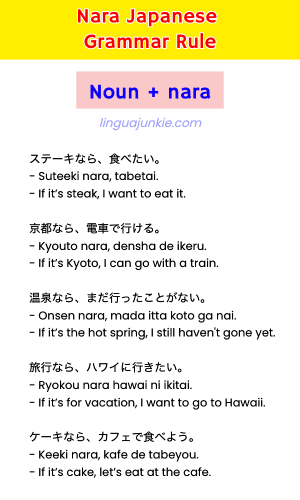
Rule #2 Adjective + nara
- Summary: Making “if” statements with adjectives.
- 嫌いなら、残していいよ。
- Kirai nara, nokoshite iiyo.
- If you don’t like it, you don’t have to finish it.
This is similar to how nouns work with nara but it also applies to adjectives. These phrases also make “if” statements but with adjectives. You can add adjectives in almost any kind of conjugation with nara. One important thing with adjective + nara is that it’s not common to use the polite form when making these sentences. It wouldn’t make sense to use suki desu, the polite form of suki with nara.
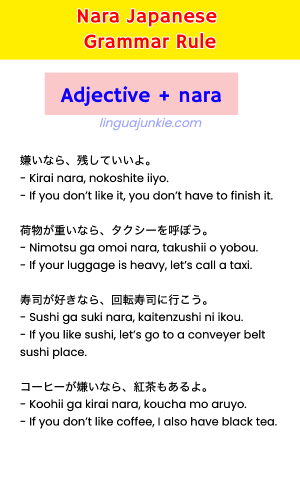
Rule #3 Verb + nara
- Summary: Making “if” statements with verbs.
- 座りたいなら、この席空いてるよ。
- Suwaritai nara, kono seki aiteru yo.
- If you want to sit, this seat is free.
When using verbs with nara it is most similar to adjectives + nara. You can also use almost any kind of conjugation to go with the statement. However, since nara is slightly casual you wouldn’t want to use any of the polite forms of the verb. This makes sentences with verb + nara very versatile. You can express “if” statements in different tenses and situations.
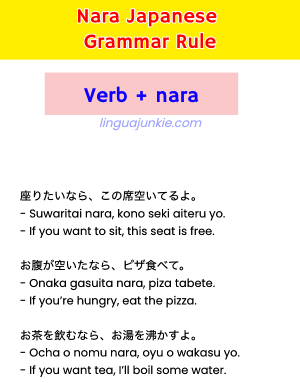
Rule #4: no nara grammar pattern
- Summary: “No” before “nara” more emphasis on “if.”
- 遊びに行きたいのなら、勉強しなさい。
- Asobi ni ikitai no nara, benkyou shinasai.
- If you want to go out, please study.
You can easily add more emphasis to your “if” statements by adding no before nara. However, this is not too common. It sounds a bit wordy to use no + nara. Most people will simply omit no. You can add adjectives, nouns, and verbs before no nara as shown in the previous rules.
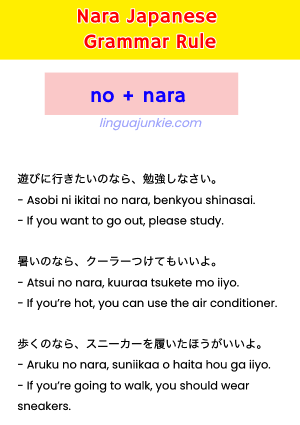
Rule #5 Kore/Sore/Are + nara
You’ll hear this nara Japanese grammar pattern often in conversations…
- Summary: If that’s the case/If this is the case
- それなら、明日はピザ食べに行こう。
- Sore nara, ashita wa piza tabeni ikou.
- Then, let’s go eat a pizza tomorrow.
“This” and “that” also work together with nara. Since the words “this” and “that” represent nouns, it works similarly with noun + nara. For example, you can make a sentence like “If it’s this, I want to eat it” or これなら食べたい (kore nara tabetai). Sore, which means “that”, when used with nara also has another meaning which can be more like “then”. You can make a phrase like “Then, I’d like to get a sandwich” which would be それなら、サンドイッチが欲しい (Sore nara sandoicchi ga hoshii).
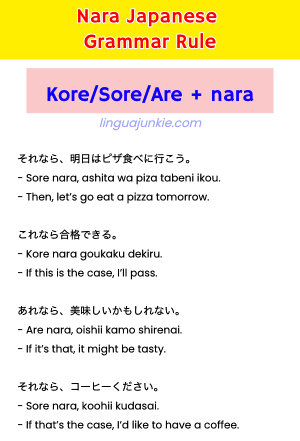
Rule #6 nara + ba
- Summary: The nara ba grammar pattern makes it more formal than just nara.
- 明日ならば、空いてるよ。
- – Ashita naraba, aiteruyo.
- – If it’s tomorrow, I’m free.
Nara + ba is a bit more formal than only using nara. You can combine it with nouns, adjectives, and verbs with the same rules explained earlier. Another unique aspect is that it can also be used by itself to mean “If that’s the case”. For example, if someone tells you it will be sunny tomorrow, you can reply “if that’s the case, let’s go tomorrow” or ならば、明日行こう!(naraba ashita ikou).
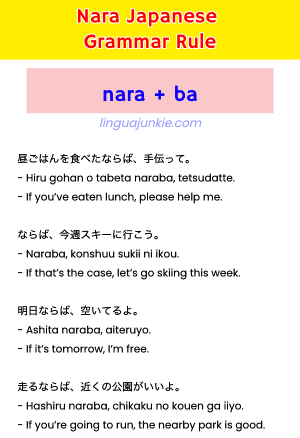
Rule #7 nara
Here’s an interesting use of the nara Japanese grammar rule.
- Summary: If used alone, nara is “in that case…” or “then…”
- なら、明日にしよう!
- Nara, ashita ni shiyou!
- Then, let’s do it tomorrow!
You can use nara by itself to mean “Then”, or “In that case”. If you hear that it’s your friend’s birthday tomorrow, you can reply by saying なら, 明日ケーキ食べに行こう ( nara, ashita keeki tabeni ikou) or “Then, let’s go eat cake tomorrow!”. In this way, the part before nara is implied. You could also say “If it’s your birthday, let’s go eat cake tomorrow” which would be 誕生日なら、明日ケーキ食べに行こう。(tanjoubi nara, ashita keeki tabe ni ikou).
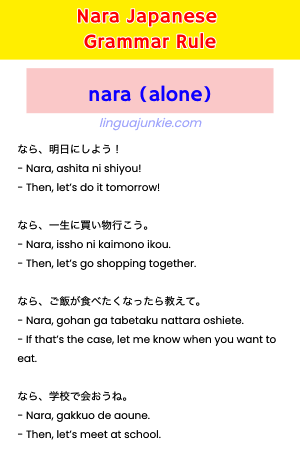
Conclusion – Back to You.
Now, I hope you have a decent idea of how this nara Japanese grammar rule is used.
- To make if/if then statements
If you want to practice, leave a comment.
Or, read through the rules some more.
If you want to save this page, go ahead and print it out.
Either way, thanks for reading and for learning Japanese with Linguajunkie.
Other grammar articles:
– The Main Lingua Junkie
 | Want FREE Japanese Grammar & Vocab Cheat Sheets? Click Here to Get 20+ Cheat Sheets from JapanesePod101 (a Japanese learning program.) |